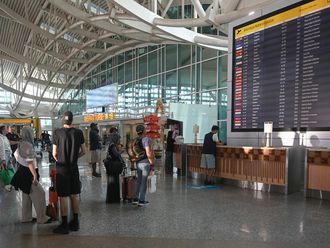Beijing: China’s censors did their best on Saturday to block discussion of a New York Times investigation into Premier Wen Jiabao, but analysts said the report would still likely reach tens of millions of people.
Detailing a string of deals on Friday, the newspaper said that relatives of the government’s number two — a self-styled man of the people known popularly as ‘Grandpa Wen’ — had become “extraordinarily wealthy” during his tenure.
Investments by Wen’s son, wife and others spanning the banking, jewellery and telecom sectors were worth at least $2.7 billion (Dh9.9 billion) according to an analysis of company and regulatory filings from 1992-2012.
State-run newspapers made no mention of the scandal on Saturday, while China’s army of censors ensured that searches for The New York Times or other related terms returned no results on social networks and search engines.
The English-language and Chinese websites of the American newspaper were also blocked in China and reports on international television channels CNN and BBC World were blacked out.
“Only a small proportion will be aware of the story,” seasoned China watcher Willy Lam told AFP.
He estimated that about 10 per cent of China’s 500-million-strong online population would still manage to evade the censors, however, amounting to about 50 million people.
“The NYT story will hurt Wen Jiabao... his reputation will be adversely affected,” he explained, adding that many Chinese had become very cynical about the wealth accumulated by those near the centres of power.
“Most Chinese just assume that the top leaders are corrupt,” he said.
The revelations come as a particular embarrassment for Wen, who is the standard-bearer of the Communist Party’s reformist wing and has campaigned against corruption.
In a speech published in April, he said official corruption was “the biggest danger facing the ruling party” and warned that “those who hold political power may perish” unless it is addressed.
The NYT report coincided with the announcement that former regional Communist Party boss Bo Xilai had been stripped of his parliamentary seat ahead of an expected trial, which was meant to signal a new get-tough approach on graft.
Bo’s expulsion from the National People’s Congress came after state media announced last month that he would “face justice” for alleged abuse of power, taking bribes and improper sexual relations.
The NYT investigation darkens the clouds hanging over the Communist Party caused by the Bo scandal as the regime prepares to name successors to Wen and President Hu Jintao in a once-in-a-decade leadership change starting November 8.
The New York Times said in a blogpost that the investigation into Wen had taken a year and that the newspaper knew of the likely impact on its business prospects in China.
It invested in a Chinese-language version of its website only recently and will lose out on advertising revenue if it remains unavailable to the public.
“I’m very proud of this work,” New York Times publisher Arthur Sulzberger was quoted as saying in the post. “Our business is to publish great journalism. Does this have a business impact? Of course.”
In June, business news agency Bloomberg published an investigation into the finances of Vice President Xi Jinping, who is expected to be promoted to president at a Communist Party congress next month.
Bloomberg’s website is still blocked and Chinese banks were encouraged to stop using financial data provided by the US company.
Beijing on Friday dismissed the NYT report as an attempt to tarnish China, with foreign ministry spokesman Hong Lei telling reporters in response to a question on the article: “Some reports smear China and have ulterior motives.”
– AFP












